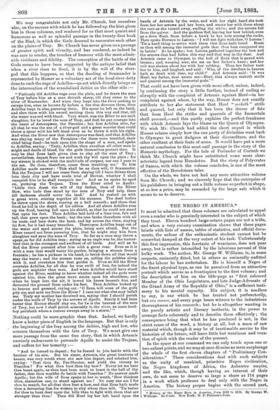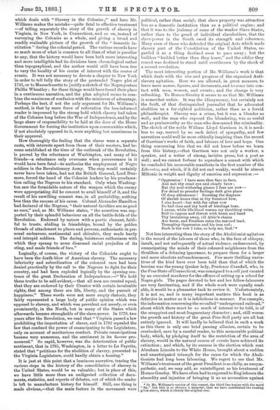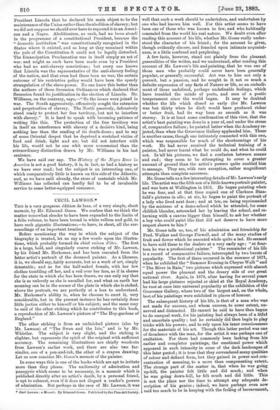THE NEGRO IN AMERICA.*
IT must be admitted that these volumes are calculated to appal even a reader who is genuinely interested in the subject of which they treat. Eleven hundred large-octavo pages are not a trifle, and when a very cursory examination shows that these pages bristle with lists of names, tables of statistics, and official docu- ments, the ardour of the enthusiastic student cannot but be somewhat damped at the very outset of his task. Unfortunately this first impression, this foretaste of weariness, does not pass away, but is rather intensified by the laborious perusal of this bulky work. The author, Mr. George W. Williams, is, in some respects, eminently fitted, but in others as eminently unfitted for the labour he has undertaken. He is himself a Negro of the finest physical type, as can be perceived from an attractive portrait which serves as a frontispiece to the first volume ; and the description of him on the title-page as " first coloured Member of the Ohio Legislature, and late Judge-Advocate of the Grand Army of the Republic of Ohio," is a sufficient testi- mony to his mental capacity. His subject, it is needless to say, is one which he has treated not perfunctorily, but con amore, and every page bears witness to the industrious thoroughness of his research ; but he is altogether wanting in the purely artistic and literary instincts, in the power to arrange facts coherently and to describe them effectively ; the consequence being that what he has produced is not, in the strict sense of the word, a history at all, but a mass of raw material which, though it may be of inestimable service to the historian of the future, will leave little but weariness and vexa- tion of spirit with the reader of the present.
In the space at our command we can only touch upon one or two salient points, and we may at once dismiss as mere surplusage the whole of the first eleven chapters of "Preliminary Con- siderations." These considerations deal with such subjects as the unity of mankind, primitive Negro civilisation, the Negro kingdoms of Africa, the Ashantee empire, and the like, which, though having an interest of their own, do not seem to deserve so large a share as 114 pages in a work which professes to deal only with the Negro in America. The history proper begins with the second part,
• History of the Negro Race in Americo, from 1619 to 1830. By George W. Williams. In 2 vol-•. New York: G. P. Putnam's Sons. which deals with " Slavery in the Colonies ;" and here Mr. Williams makes the mistake—quite fatal to effective treatment —of telling separately the story of the growth of slavery in Virginia, in New York, in Connecticut, and so on, instead of surveying the Colonies as a whole, and giving a broad and readily realisable picture of the growth of the " domestic in- stitution" during the colonial period. The various records have so much more of what is common to all than of what is peculiar to any, that the history would have been both more interesting and more intelligible had its divisions been chronological rather than topographical, and the author would still have been free to vary the locality of his centre of interest with the course of events. It was not necessary to devote a chapter to New York in order to tell fully the story of the pretended Negro plot of 1741, or to Massachusetts to justify a sketch of the Negro poetess Phillis Wheatley ; for these things would have found their place in a continuous narrative, and the plan adopted seems to com- bine the maximum of confusion with the minimum of advantage. Perhaps the best, if not the only argument for Mr. Williams's method, is that by mere force of reiteration the less-informed reader is impressed by the strong hold which slavery had taken of the Colonies long before the War of Independence, and by the large share of responsibility to be laid at the door of the Home Government for forcing the institution upon communities which, if not absolutely opposed to it, were anything but unanimous in their approval.
How thoroughly the feeling that the slaves were a separate caste, with interests apart from those of their masters, had be- come established at the time of the outbreak of the Revolution, is proved by the reluctance of Washington, and many of his Triends—a reluctance only overcome when perseverance in it would have been fatal—to authorise the employment of Negro soldiers in the Revolutionary Army. The step would certainly never have been taken, had not the British General, Lord Dun- more, forced the hand of the Colonist leaders by his proclama- tion calling the Negroes to his standard. Only when Washing- ton saw the formidable nature of the weapon which the enemy were appropriating did he consent to avail himself of it, and the result of his unwilling consent was, in all probability, nothing less than the success of his cause. Colonel Alexander Hamilton had declared of the Negroes, " their natural faculties are as good as ours," and, as Mr. Williams states, " the assertion was sup- ported by their splendid behaviour on all the battle-fields of the -Revolution. Endowed by nature with a poetic element, faith- ful to trusts, abiding in friendships, bound by the golden threads of attachment to places and persons, enthusiastic in per- sonal endeavour, sentimental and chivalric, they made hardy and intrepid soldiers. The daring, boisterous enthusiasm with which they sprang to arms disarmed racial prejudice of its sting, and made friends of foes."
Logically, of course, the victory of the Colonists ought to have been the death-blow of American slavery. The necessary inferiority and subordination of the coloured race had been denied practically by the call to the Negroes to fight for their country, and had been exploded logically by the opening sen- tence of the great Declaration of Independence :—" We hold these truths to be self-evident,—that all men are created equal, that they are endowed by their Creator with certain invaluable rights, that among these are life, liberty, and the pursuit of happiness." These words were not mere empty rhetoric, they fairly represented a large body of public opinion which was opposed to slavery, and which was prevalent not merely, or even prominently, in the North, but in many of the States which afterwards became strongholds of the slave-power. In 1778, two years after the Revolution, we read that " Virginia passed a law prohibiting the importation of slaves, and in 1782 repealed the law that confined the power of emancipating to the Legislature, only on account of meritorious conduct. Private emancipations became very numerous, and the sentiment in its favour pro- nounced." So rapid, however, was the deterioration of public sentiment, that in 1785, Washington, in a letter to La Fayette, stated that "petitions for the abolition of slavery, presented to the Virginia Legislature, could hardly obtain a hearing."
It is just at this point that a luminous narrative, tracing the various steps in the history of the consolidation of slavery in the United States, would be so valuable ; but in place of this, we have little more than an undigested collection of docu- ments, statistics, and reports of debates, out of which the reader is left to manufacture history for himself. Still, one thing is made obvious,—that the main factors in the movement were political, rather than social; that slave property was attractive
less as a domestic institution than as a political engine ; and that it was to the jealousy of some of the weaker Slave States, rather than to the greed of individual slaveholders, that the slave-power in the South owed its strength and coherence. Many even of those who defended the original Acts which made slavery part of the Constitution of the United States, re-
garded it as a thing destined soon to pass away ; but the builders " builded better than they knew," and the edifice they reared was destined to stand until overthrown by the shock of a second revolution.
The most interesting portion of Mr. Williams's work is that which deals with the rise and progress of the organised Anti- slavery agitation. Here we are allowed, in great measure, to leave mere names, figures, and documents, and to come into con- tact with men, women, and events ; and the change is very refreshing. To Horace Greeley it seems to us that Mr. Williams is somewhat unfair. It was the idiosyncrasy, but certainly not the fault, of that distinguished journalist that he advocated abolition as a far-sighted politician, rather than as a fervid philanthropist. Slavery was a crime, but it was a blunder as well; and the man who exposed the blundering, was as useful and as praiseworthy as the man who denounced the criminality. The sketch of the noble William Lloyd Garrison is, it is need- less to say, marred by no such defect of sympathy, and few narratives could well be more ethically inspiring than the record of Garrison's works of faith, and labours of love and hope. One thing concerning him that we did not know before we learn from this history,—that Garrison was not only a worker, a
speaker, and a writer of strong, incisive prose, but a poet as well ; and we cannot forbear to reproduce a sonnet with which he concluded his memorable manifesto in the first number of the Liberator, and which, if it did not end weakly, would be almost
Miltonic in weight and dignity of emotion and expression :-
" Oppression ! I have seen thee face to face,
And met thy cruel eye and cloudy brow ;
But thy soul withering glance I fear not now—
For dread to prouder feelings cloth give plane Of deep abhorrence ! Scorning the disgrace Of slavish knees that at thy footstool bow, I also kneel—but with far other vow Do hail thee and thy herd of hirelings base.
I swear, while life-blood warms my throbbing veins, Still to oppose and thwart with heart and hand Thy brutalising sway, till Afric's chains Are burst, and Freedom rules the rescued land, Trampling Oppression and his iron rod; Such is the vow I take, so help me, God."*
Not less interesting than the story of the Abolitionist agitators is the record of the labours of those who, in the face of obloquy, insult, and not unfrequently of actual violence, endeavoured, by emancipating the minds of their coloured neighbours from the thraldom of a debasing ignorance, to prepare them for a larger and more absolute enfranchisement. Few more thrilling narra- tives of the kind have ever been told than that of which the heroine was the young Quaker lady, Prudence Crandall, who, in the Free State of Connecticut, was consigned to a cell just vacated by an executed murderer for the offence of setting up a school for Negro girls. The pages devoted to her and her fellow-labourers are very fascinating, and if the whole work were equally read- able, it would be a pleasanter task to review it. Unfortunately, it is not so, and in many important matters this book is as defective in matter as it is infelicitous in manner. For example, the information concerning the so-called " underground railroad," about which there must be so much of interest to be told, is of the scrappiest and most fragmentary character ; and, still worse, the growth and history of the great Free-Soil party are all but entirely ignored. It will hardly be believed that in such a work as this there is only one brief passing allusion, certain to be overlooked, save by a careful reader, to this memorable political body, which, by pledging itself to the restriction of the area of slavery, would in the natural course of events have achieved its extinction ; and which, by its success in the election which sent Abraham Lincoln to the White House, brought about a sudden and unanticipated triumph for the cause for which the Aboli- tionists had long been labouring. We regret to see that Mr. Williams's treatment of the great President is as chilly, as unsym- pathetic, and, we may add, as unintelligent as his treatment of Horace Greeley. We have often had to expound to Englishmen the absurdity and injustice of bringing it as an accusation against * In Mr. Williams's version of this sonnet, the third line begins with the word " By." bat this is so obvious a misprint, that we have substituted the reading given above, which is dearly the original one. President Lincoln that he declared his main object to be the maintenance of the Union rather than the abolition of slavery; but we did not suppose we should ever have to expound it to an Ameii- can and a Negro. Abolitionism, as such, had no locus standi in the programme of a constitutional President, because the "domestic institution" was constitutionally recognised in the States where it existed, and so long as they remained within the pale of the Constitution it could not be legally disturbed. The Emancipation Proclamation was in itself simply an act of war, and might as such have been made even by a President who had no anti-slavery convictions ; but every one knows that Lincoln was the representative of the anti-slavery feeling of the nation, and that even had there been no war, the certain outcome of his restrictive policy would have been the speedy strangulation of the slave-power. No one knew this better than the authors of those Secession Ordinances which declared that Secession found its justification in the election of Lincoln. Mr. Williams, on the contrary, says,—" So the issues were joined in war. The South aggressively, offensively sought the extension and perpetuation of slavery. The North passively, defensively stood ready to protect her free territory, but not to interfere with slavery?' It is hard to speak with becoming patience of writing like this. The protection of the free territory was in itself an interference with slavery of a decisive kind, being nothing less than the reading of its death-doom ; and to say of some Oriental despot that he deprived a wretched victim of food and drink, light and air, but did not interfere with his life, would not be one whit more nonsensical than the extraordinary distinction drawn by Mr. Williams in his last sentence.
We have said our say. The History of the Negro .Race in. America is not a good history, it is, in fact, as bad a history as we have ever read; but the subject is an interesting one, of which comparatively little is known on this side of the Atlantic, and, as we have said already, the store of materials which Mr. Williams has collected can hardly fail to be of invaluable service to some better-equipped successor.




































 Previous page
Previous page